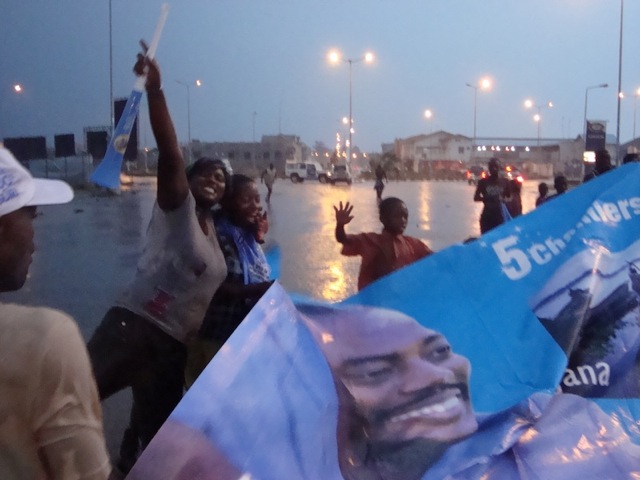Waiting, Sitting, Wishing
 On December 6 this past year, I was anxious to get to Goma, a city in the Democratic Republic of the Congo (DRC), to witness the nation’s presidential election. While my flight was originally at 10:50 a.m., I headed to the Jomo Kenyatta airport in Nairobi at 7 a.m. in hope that I could instead catch an earlier flight. Little did I know that my desire to get to Goma in time for this historic statement would be worthless; the rest of the DRC and I would have to wait until December 9 for the results of the election.
As I waited for the election to happen, I spent my time exploring Goma. A funny town, Goma is known as the "tourist capital of Congo," but it is entirely financially supported by the heavy presence of NGO and United Nations workers, so most businesses in Goma have been built specifically for these customers. There are three kinds of bars in Goma: UN/NGO only, ones for locals only, and the rare mixture of the two. While I spent my nights exploring the bars and nightclubs and learning the steps of a South African choreographed dance routine, the nights leading to the announcement of the election results in Goma were spent waiting and whispering for the seemingly forever-delayed announcement.
On December 6 this past year, I was anxious to get to Goma, a city in the Democratic Republic of the Congo (DRC), to witness the nation’s presidential election. While my flight was originally at 10:50 a.m., I headed to the Jomo Kenyatta airport in Nairobi at 7 a.m. in hope that I could instead catch an earlier flight. Little did I know that my desire to get to Goma in time for this historic statement would be worthless; the rest of the DRC and I would have to wait until December 9 for the results of the election.
As I waited for the election to happen, I spent my time exploring Goma. A funny town, Goma is known as the "tourist capital of Congo," but it is entirely financially supported by the heavy presence of NGO and United Nations workers, so most businesses in Goma have been built specifically for these customers. There are three kinds of bars in Goma: UN/NGO only, ones for locals only, and the rare mixture of the two. While I spent my nights exploring the bars and nightclubs and learning the steps of a South African choreographed dance routine, the nights leading to the announcement of the election results in Goma were spent waiting and whispering for the seemingly forever-delayed announcement.
Finally, on Friday at 5 p.m., Joseph Kabila was at last declared the new president. The timing came as a surprise, since it was rumored that results would come in the middle of the night when people were asleep. Nevertheless, the streets are usually at their busiest at 5 p.m. on Fridays. As I watched the announcement and pre-recorded rap videos for Kabila's victory on TV, I could hear Goma's reaction: vuvuzelas, horns, drums, honking, singing, and shouting filled the air. Kabila paraphernalia popped up everywhere. That evening in Goma, for the most part, went without incident, except for a few motorbike accidents and one mzungu journalist being pick-pocketed by pint-sized street urchins.
After observing this response, I set forth to see if there had been any incidents in any of the villages surrounding Goma. But what I was looking for, a peak into the so-called heart of darkness, was nowhere to be found on this four-hour day trip outside of the sleepy volcano town. I asked Gerard, a friend of mine who had allowed me to stay with him for this trip, about the curious lack of problems, noting that this region had been entitled the “rape capital of the world.”
“We are harboring two different wars here in the bush; the Rwandan genocide and the Ugandan tribal wars with groups like the LRA,” explained Gerard. The Congo has two different problems. On one hand, there are many Congolese rebel groups that predominantly function around and control the mines. The other problem is the rebels outside Congo. After hearing this, I mused on whether the announcement of the presidential election results was delayed in order to give Kabila enough time to finish production of victory rap videos and propaganda proudly touting “Kabila 100% SUR".
As we headed back to Goma, I let Gerard’s words settle, but they were difficult to accept because of the beautiful landscape – lush green fields, tall tropical trees, dramatic rock sided mountains, hunching over a seemingly endless emerald lake – I saw as we drove through the landscape. Instead of rebels running these parts, I wondered where all the scientists were, as we drove spiraling down a mountain that was a giant rock slab, with faint lines across it signifying age, looking of great geological importance. But then I remembered something an officer at the South African military camp had told me just hours before – that the wars and fighting here are actually a direct result of the Congo’s beauty and richness that it can offer the world.
Looking back at my week in the Congo, waiting, sifting through rumors, and cruising around in land cruisers, my views on the election remain unresolved, despite the peaceful response to it. I felt ill at ease about it, and I can only imagine how the Congolese feel. Kabila admitted that the elections weren’t run perfectly, but, as of December 16, the Supreme Court in Kinshasa is upholding the legitimacy of Kabila’s win. It is hard to see good coming from Kabila’s victory, but holding another election now would likely prove much more detrimental then another five years with Kabila. And that’s just it, the election process is finally over and after much waiting and confusion – surprise, surprise, Kabila it is.






